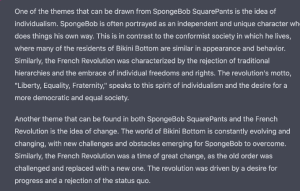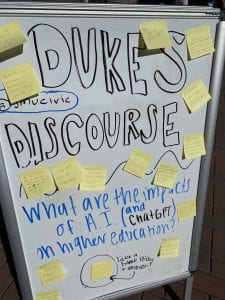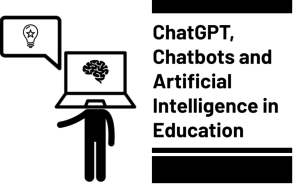Artificial Intelligence: An Existential Threat to Higher Education?
February 15, 2023
By Adrik Bagdasarian, ‘23 International Affairs, Woodson Martin Democracy Fellow
For college students, the “essay” is a fundamental assignment that examines a student’s ability to critically think and convey original thoughts into words. Technological innovations have aided academics and writers alike, such as Microsoft Word’s red line highlighting misspelled words, and, more recently, Grammarly, a tool that helps writers with spelling, grammar, and writing style. However, with the utilization of artificial intelligence, the company OpenAI has sent higher education into a spiral of dread with their new product, ChatGPT.
In 2015, OpenAI was founded by a group of tech industry magnates and venture capitalists, including Elon Musk of Tesla, Reid Hoffman (co-founder of LinkedIn), and Peter Theil (co-founder of PayPal). Other tech companies like Microsoft have been quick to make multi-billion dollar investments in OpenAI’s future. OpenAI currently leads the consumer artificial intelligence market, with its most significant products being DALL·E 2, an AI system that generates images based on a text description, and ChatGPT, which develops human-like text based on user input.
Regardless of the innovative brilliance of ChatGPT, the product has already caused disruption and uncertainty to the future of many industries, including higher education, where creativity and writing can easily be replaced by the power of ChatGPT. The general fear from faculty is that ChatGPT will be used to complete assignments, from short discussion board posts to longer essays. These concerns are validated by the flexibility of the product. For example (see below), I asked ChatGPT to write an academic essay comparing the children’s show Spongebob Squarepants to the French Revolution. Despite the vast differences in the topics, ChatGPT was able to generate an essay linking common themes of “individualism” and “change.”

Numerous tests have already been conducted to examine the practical capabilities of ChatGPT in higher education. Researchers from the University of Minnesota Law School recently assessed ChatGPT’s performance on final exams for four of its courses, including constitutional law, taxation, and federalism. Through a blind grading process, the researchers found that the artificial intelligence had scored a passing grade of a C+, which was averaged between the four tests. The researchers concluded that if this performance remained consistent throughout law school, ChatGPT would adequately graduate with a J.D.
In another case, a professor from the University of Pennsylvania’s Wharton School conducted a similar experiment to analyze ChatGPT’s performance on the school’s final examination for the Master of Business Administration (MBA) program. ChatGPT, again, scored with a passing grade between a B and B-. Professor Christian Terwiesch, who conducted the research, remarked that ChatGPT demonstrated a “remarkable ability to automate some of the skills of highly compensated knowledge workers in general and specifically the knowledge workers in the jobs held by MBA graduates, including analysts, managers, and consultants.”
With ChatGPT threatening academic integrity at higher education institutions worldwide, many K-12 school districts have begun to impose methods to combat the use of artificial intelligence. At the beginning of 2023, The New York City Department of Education became the first district to ban ChatGPT from building wifi networks, citing “negative impacts on student learning, and concerns regarding the safety and accuracy of content.” In a similar move, Seattle Public Schools and Los Angeles Unified School District banned the use of the product while connected to school networks.
Recognizing the threat of its own software, OpenAI recently released a free tool designed to detect when ChatGPT has been used to generate text. Despite claiming to “distinguish between text written by a human and text written by AIs,” OpenAI warns that its tool is “not fully reliable” and “should not be used as a primary decision-making tool.”
The lack of an effective AI detection tool is cause for concern for higher education institutions, especially in regard to academic integrity and plagiarism. According to the James Madison University Honor Code, plagiarism is “copying information, ideas, or phrasing of another person without proper acknowledgment of the true source; writing or presenting as if it is your own information, ideas, or phrasing without proper acknowledgment of the true source.” Since ChatGPT’s machine learning depends on scanning a massive dataset of written works, by human beings, found online, the use of AI on written assignments would be considered plagiarism, as it is impossible to correctly cite the original source(s) ChatGPT used when machine learning.
Despite disrupting creativity and higher education, not all academics agree on the entirely pessimistic attitude toward ChatGPT. Ethan Mollick, a professor at the University of Pennsylvania’s Wharton School of Business, shared that he used ChatGPT to assist in the crafting of syllabi, lectures, assignments, and grading rubrics for his MBA students. Mollick remarked that ChatGPT could be used as a “learning companion” and a “multiplier of ability.”
Dukes Discourse – Informal Spaces to Talk Wicked Issues
On February 24th, the Madison Center’s Democracy Fellows held the second “Dukes Discourse” informal talk on ChatGPT and the classroom experience. When asked if they’ve used ChatGPT and if it was plagiarism or a violation of the university’s honor code, students and faculty said: 
- Students need to do the reading! Not use ChatGPT for homework!
- Could impact students learning
- Chat GPT helped with me Spanish homework
- ChatGPT can’t do Chemistry
- Yes! It helps explain content well
- I think more professors are talking about ChatGPT than students
- I like ChatGPT but I have not used it yet. I will now. It’s not cheating
- Not hurtful but it leads to different ways of learning
- Doesn’t tell you the answer straight
- It’s like Google
- No, but I can’t wait to try it <3
- Could impact the value of learning and critically thinking about important topics
- I’ve used it and I think it is more open ended and a better study tool than a source of cheating
- Generally harmful; it defeats the purpose of academic writing and fostering of genuine intellectual community
- Worry of plagiarism for creativity
- ChatGPT is not good people people are going to start having the same opinions
- ChatGPT can use used for so many things but can increase plagiarism
- Gets rid of busy work
- ChatGPT is great for higher education, and even better for saving time by having AI do something quickly that would have taken awhile
- ChatGPT is the FUTURE!
- I haven’t. I don’t want to give robots that much power
- I use it to quiz myself and study
- It has the potential to affect the integrity of the honor code installed in our academics
- I don’t see a reason to be afraid of it yet.
And perhaps the best comment of the day on the benefits ChatGPT:
- I used ChatGPT to write a valentines day poem for my crush


Recent Comments